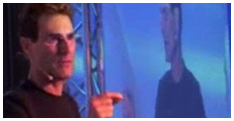Man blind for nearly a decade suddenly sees again
By MARK JOHNSON
Milwaukee Journal Sentinel
August 22, 2000
EAU CLAIRE, Wis. – Father Edmund Klimek, the silver-haired chaplain at Sacred Heart Hospital, sat in his office one morning in May staring through thick spectacles at the list of patients he planned to visit. At 8 a.m., his little corner of the hospital was peaceful.
Then, a fist pounded the door.
“Father Klimek! Father Klimek!” shouted Renay Poirier at the door.
Poirier, a 40-year-old physical therapy assistant, had a wife and two children, whose faces he had not seen in almost a decade since the day he was blinded in an electrical explosion. Now, Poirier stood in the Klimek’s doorway, wild with excitement.
“I can see!” he shouted. “I can see!”
Poirier had a strong faith, the stronger for having been tested. Born in Bloomer, a small city of 3,000 about 25 miles north of Eau Claire, Poirier was 5 years old when his parents divorced. His mother, a nurse, was left to raise five children by herself.
Poirier grew into an athletic young man. In his senior year of high school, he quarterbacked the Bloomer football team to Heart of the North champion ship. He ran track and pole vaulted.
He and Connie Baier were childhood sweethearts. At 23, they were engaged. At 24, they were married. In a few years, they had a daughter, Alea, and two years later, a second girl, Kara.
Soon after Kara’s birth, on the morning of Oct. 9, 1990, Poirier left the family’s three-bedroom ranch in Eau Claire for his job at Cray Re search in nearby Chippewa Falls.
Poirier was 6-foot-1 and had retained his athletic build since high school. At Cray, he was a senior maintenance technician, working with electrical, air conditioning and lighting systems. He fixed problems, and on this day, they had a big one. The entire building complex had lost power.
While Poirier was working outside one of the buildings, two groups of electrical wires housed in a metal cabinet touched, triggering a high-voltage explosion. Poirier was thrown backward. Later, he would not be able to remember where his body had landed, or whether he had lost consciousness. His first clear memory after the accident: pain. Pain in his neck, shoulders and back. Pain in his eyes.
When Poirier’s ophthalmologist, James Redmann, examined him, he found a few small lesions on the cornea of each eye. Lesions of this kind will usually heal with treatment; when they healed, Redmann believed, Poirier’s vision would improve. Within three weeks, the lesions had healed.
But Poirier’s vision did not improve. It got worse and he was in deep pain. Try as he might, Redmann could not explain it. He tested the flow of blood to Poirier’s eye and did an MRI to search for defects in the brain or back of the eyes. He found nothing with either test.
And yet something terrible had happened to Poirier’s vision, which had been 20/20 before the accident. In Wisconsin, a person with 20/200 vision is considered legally blind. Poirier’s vision was now worse than 20/400.
Poirier could see a hand a few feet in front of his face. That was all.
He stayed home from work for weeks, then months. He couldn’t drive. He couldn’t read. His wife and daughters were blurs, differing only in size. He was afraid of stepping on one of the girls and hurting her.
Once he overheard one of his wife’s friends try to comfort her: “It must be just terrible for you. It’s like taking care of another kid.” The words stung.
He loved to cook, but he couldn’t see when things boiled, and by the time he heard them, it was too late. The family bought a new stove with a glass top, and Poirier put marks down with glue to indicate low, medium, high. They bought a bike built for two and his wife rode in front so that she could steer.
In June 1991, eight months after the accident, Poirier went back to work, but being the assistant to the man replacing light bulbs did not make him feel better about himself.
His faith in God was not shaken, but his faith in himself was. It had been a long time since he felt useful. Then one afternoon, a month and a half after he had returned to work, Poirier was riding home in a cab. On the street, a man waved his arms for the cab to pull over. A 78-year-old woman had suffered a heart attack.
Poirier explained that he knew cardiopulmonary resuscitation, but could not see. Some one would have to guide him to the woman. The man grabbed his arm. Poirier performed CPR for about 10 minutes and was able to keep the woman alive until paramedics arrived.
Even though the woman died a few days later, her relatives had called him a hero, and her saw himself in a different light.
More than a month later, he lost his job.
Determined to return, he learned to use a special computer, sticking Braille tabs on the home row of the keyboard. It took a year to learn typing, but when Poirier did, Cray hired him back. This time he typed work orders, tracked productivity and served as the engineering/maintenance safety representative. Although he enjoyed the work, it didn’t last. After a year (late 1993), he lost this job again, and his mood darkened.
He struggled to remember his wife’s face and to imagine the changes in the girls’ looks. Even his own face was becoming a distant memory. His hands could feel the thinning hair on his head.
Not long after he lost his job at Cray for the second time, Poirier stood at the edge of the Chippewa River. He thought about jumping in. Then he thought about the woman whose life he had tried to save, and about his wife and children. He had more living to do.
In 1994, he entered the College of St. Catherine in the Twin Cities to become a physical therapist assistant. Far from being easy, it required knowing how muscles fit together, even though he could not see their shapes. He would have to keep up by audiotape to learn what the other students were reading.
In the beginning, Poirier received tutoring from other students. Later he became a tutor himself. The two-year program took Poirier 2-1/2 years to complete, and in May 1997 he graduated. That September he was hired by Sacred Heart Hospital, where his reputation with patients and staff alike was outstanding.
On May 23 of this year, Poirier stood by the ninth-floor window of the hospital, wiping one of his instruments, when pain erupted in his head, a headache so severe he grabbed at his temple. In the next instant, he felt numb. Light flooded his eyes. Then, a sensation of floating on air. Then he realized he was actually seeing things down on the ground.
He ran to the hospital chapel to pray and to thank God.
He wanted someone to be there with him. And that was how he came to be standing in Klimek’s doorway. The chaplain went with him, and they prayed and read the Bible together.
Redmann gave Poirier an eye test. His vision was now 20/40, “a dramatic improvement,” in the doctor’s view. At that level, Poirier might have trouble reading the fine print on an eye-drop bottle, but he could probably read a newspaper.
In explaining what had happened to Poirier, science would come up short, Redmann said.
Poirier called the return of his vision “a gift from God.”
(For news and information about Milwaukee visit http://www.jsonline.com/ Distributed by Scripps Howard News Service.)


Latest Articles

Motivational Inspirational Speaker
Motivational, inspirational, empowering compelling 'infotainment' which leaves the audience amazed, mesmerized, motivated, enthusiastic, revitalised and with a much improved positive mental attitude, state of mind & self-belief.



















